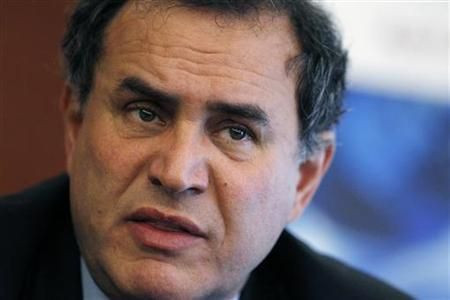Coronavirus Update: Roubini, Other Economists, Warn Of Global Financial Catastrophe

KEY POINTS
- Roubini said Europe should close its borders
- Roubini expects global equities to plunge by 30% to 40% this year
- Oxford Economics sai virus may cost global economy up to $1 trillion in lost output
Renowned economist Nouriel Roubini said he thinks the ongoing coronavirus epidemic will lead to global economic disaster and that too many observers are underestimating its potential impact.
Roubini, famously called “Dr. Doom” and for accurately predicting the housing crash and financial crisis of 2008, told Germany’s Der Spiegel: “This crisis is much more severe for China and the rest of the world than investors have expected. First, it is not an epidemic limited to China, but a global pandemic. Second, it is far from being over. This has massive consequences, but politicians don’t realize it.”
Roubini said European governments are unwise for not closing their borders to stave off further virus infections.
“Europe is afraid of closing its borders, which is a huge mistake,” he charged. “The Italian borders should be closed as soon as possible. The situation is much worse than 1 million refugees coming to Europe.”
Roubini pointed out that the economic consequences of the virus will be hard to overcome.
“If the Chinese economy were to shrink by 2% in the first quarter, it would require growth of 8% in the final three quarters to reach the 6% annual growth rate that everyone had expected before the virus broke out,” he said. “If growth is only 6% from the second quarter onwards, which is a more realistic scenario, we would see the Chinese economy only growing by 2.5 to 4% for the entire year. This rate would essentially mean a recession for China and a shock to the world.“
Other economists are also gravely concerned about the virus.
“This is going to tip the global economy into recession,” said economist Gary Schilling. “It’s been brewing for months and no one knows where it stands. No one understands supply chains until one of the links breaks. I sure don’t know where the bottom is here. But I think it’s a lot lower than where we are now.”
Roubini is particularly skeptical about Europe’s chances of staving off this imminent recession with fiscal policy measures.
“Europe would have needed fiscal stimulus even without the [coronavirus] crisis,” he pointed out. “Italy was already on the verge of a recession, as was Germany. But German politicians aren’t even thinking about stimulus, despite the country being so exposed to China. The political response is a joke -- politicians are often behind the curve. This crisis will spill over and result in a disaster.”
The only solution Roubini sees are practical steps governments could undertake to keep their people safe and healthy.
“Monetary and fiscal measures do not help when you have no food and water safety,” he noted. “If the shock leads to a global recession, then you have a financial crisis, because debt levels have gone up and the U.S. housing market is experiencing a bubble just like in 2007. It hasn’t been a time bomb so far because we have been experiencing growth. That is over now.”
Roubini said he expects global equities to plunge by 30% to 40% this year. “My advice is: put your money into cash and safe government bonds, like German bunds,” he recommended. “They have negative rates, but so what? That just means that prices will rise and rise -- you can make a lot of money that way. And if I am wrong and equities go up by 10% instead, that’s also okay. You have to hedge your money against a crash, that is more important.”
Other economists have placed a specific value on what coronavirus will ultimately cost.
Oxford Economics, an economic forecaster based in England, said if the coronavirus becomes a pandemic, it may cost the global economy up to $1 trillion in lost output -- a figure is equivalent to the entire economy of Indonesia.
Oxford Economics also predicted that China’s gross domestic product growth will fall from 6% last year to 5.4% in 2020.
“Our scenarios see world GDP hit as a result of declines in discretionary consumption and travel and tourism, with some knock-on financial market effects and weaker investment,” Oxford Economics said.
Scott Minerd, managing partner and global chief investment officer at financial services firm Guggenheim Partners, added to the grim chorus.
“[The coronavirus outbreak] is possibly the worst thing I’ve ever seen in my [30-plus-year] career,” he said. “This has the potential to reel into something extremely serious. It’s very hard to imagine a scenario where you can actually contain this, and so that’s the thing that to me is very frightening.”
Jennifer McKeown, head of the global economics service at consultancy Capital Economics, said the outbreak might still be contained.
“One thing becoming clear is we just can’t predict the spread of this and how bad it can be,” she added. “But it’s not difficult to get to something similar to the 2008 crisis with a pandemic situation. Of course, we hope it won’t get that bad.”
© Copyright IBTimes 2025. All rights reserved.





















